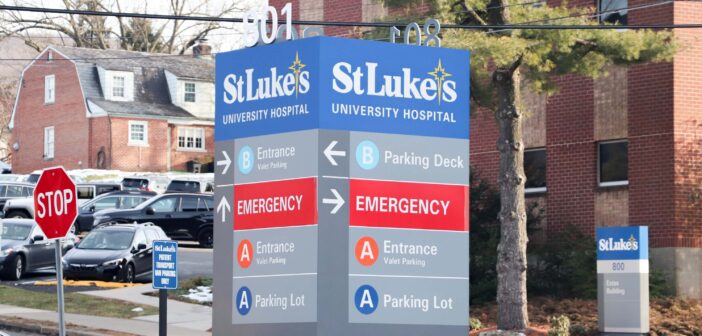At 4 years old, Samuel Uben and his family embarked on a journey across the Atlantic Ocean in search of a better life. From their farmland in the Dominican Republic to the suburbs of Allentown, Uben’s family believed immigrating to the U.S. would provide them with better opportunities.
Uben’s family knew getting an education would be crucial in order to succeed in their new environment.
In 2023, Uben graduated from William Allen High School after completing the St. Luke’s Health Career Exploration Program. He is now studying biochemistry and conducting research at Kutztown University with a full-ride scholarship.
“My dad had an outlook where if we came to the U.S. (and had) the possibility of getting a really good education, we (would) make something out of ourselves,” Uben said.
However, Uben’s inability to understand English until third grade made it difficult for him to communicate with teachers. He struggled in mathematics and his ADHD went undiagnosed until high school.
Uben’s mom faced mental illness, and his dad, who was disabled, was the main source of income in the household. His parents didn’t have a high school diploma and didn’t understand the American education system.
Uben said his parents weren’t aware of the importance of participating in extracurriculars for college applications and future employment — so much so that Uben didn’t tell his parents he was a part of a music program until he was older.
When Uben reached high school, he found an interest in science but felt unsure of how to pursue it.
The adversities Uben faced growing up are not uncommon in the American education system, due to systemic disadvantages.
Hispanic and low-income students tend to graduate at lower rates compared to their white, higher-income counterparts. This makes it difficult to break out of cycles of poverty. As Georgetown University Center on Education and the Workforce states, most well-paying jobs in America require at least a high school diploma.
According to the Lehigh County 2022 Health Assessment, 12% of the county’s population is living in poverty. Within that percentage, 27% of the Hispanic population is experiencing poverty compared to 8% of the non-Hispanic population. Three-fourths of the Hispanic population graduates from high school, compared to 95% of the non-Hispanic white population.
Victoria Montero, network director of community workforce development at St. Luke’s Hospital, said in collaboration with the Workforce Board Lehigh Valley, they work to lessen the obstacles students face and try to help them break out of poverty traps.
The St. Luke’s Health Career Exploration Program was created in 2005 to give under-resourced students work experience in the healthcare field as they receive mentorship to graduate high school and find a career path.
“We focus on equity, providing opportunities that are equal to everyone regardless of where they come from in life,” Montero said.
From an economic perspective, she said, the program chose to focus on healthcare, as it’s one of the main employers in the Lehigh Valley. This provides more opportunities for students to grow professionally and seek employment.
She said the program seeks juniors and seniors in high school from the Bethlehem and Allentown school districts who meet the income eligibility to work in clinical and non-clinical areas during the academic school year. The program exposes students to all aspects of the healthcare field so they learn the range of available careers.
“We recognize that all students, especially those in some of our most underserved communities, really need that exposure to career awareness (and) career readiness,” said Sarah Lutz, the director of youth initiatives at the Workforce Board Lehigh Valley.
Lutz said developing a program where students get work experience in a unique setting would benefit students regardless of their post-graduation plans.
Uben decided to join the program, but given the extra work and time this would add to his academic year, he said his parents questioned his reasoning for participating.
“I’ve got to prove something to myself before college applications, you know?” Uben said.
One afternoon, wearing a tuxedo, Uben rushed over to the program carrying a baritone saxophone that was almost half his size. He had finished a concert at school and wasn’t going to miss his shift at St. Luke’s. After he put away his instrument and changed, Uben started his shift like any other day.
Uben’s responsibilities varied daily: transporting ER patients for X-rays and CAT scans, shadowing doctors and translating for patients in Spanish.
Lutz said the students are learning skills that other people pay to be trained in, which gives them an advantage if they pursue a career in healthcare down the line.
Uben had lessons on career navigation, cover letters, resumes and soft skills every week. Since starting, Uben said he developed time management and problem-solving skills through his work with patients who came from diverse backgrounds and had varying emotions on a day-to-day basis.
There were also lessons on topics like financial literacy, where Uben learned how to use his first credit card and build a credit score.
Montero said the program can connect students to services like the food pantry, counseling and housing services if they need more assistance in their lives.
Lutz said the program is funded through Temporary Assistance for Needy Families, a funding stream held by the Workforce Board Lehigh Valley, though because students need to be supervised one-to-one or two-to-one, St. Luke’s can only accommodate a certain number of students per year.
One way funding is used, Lutz said, is through students’ wages; they are paid $13 per hour. This allows students to start saving money for expenses like college.
For some, generational wealth provides the ability to have a quality education and readily available resources. Yet, to lower the achievement gap, Hispanic students and low-income students who participate in the program take on extra work hours each week, in addition to school.
At the time, Uben said he was constantly running through the halls of his school to get to his classes and immediately driving off after class to attend to his other responsibilities.
He said he was working two to three jobs to help pay the bills in his household. He did all of this before becoming a legal adult.
Michael Faccinetto, the Bethlehem school board president, said one of the main reasons for the disparity between students from different backgrounds is the lack of funding schools in certain districts receive. Schools in neighborhoods like Allentown — where Uben was raised — tend to be challenged with less available resources.
Faccinetto said many of the facilities in these neighborhoods were built decades ago and are outdated. He said some of the schools don’t have access to basic educational needs like libraries, gyms and art supplies.
Faccinetto points to systematic racism as the reason state legislatures don’t invest in inner-city schools.
“We think poverty is a disease that we can catch just by being close to a student of color or low-income students,” Faccinetto said. “If these were wealthy white students, we wouldn’t be having these conversations and a lot of people don’t want to hear that.”
He said school funding comes from taxes. However, towns such as Allentown, Pottstown and Scranton would require a large tax increase to have more funds for the school district, because the property values are lower.
Faccinetto said regardless of these issues, education is crucial to successfully breaking out of poverty.
“It’s everybody’s ticket to a better life,” Faccinetto said.
Lutz said for a year after the program ends, the St. Luke’s program staff checks in with students, providing any further assistance with employment or career readiness.
Montero said the program continues to give mentorship to the graduates even if they don’t want to go to college. She said the program can help students acquire positions at St. Lukes that don’t require a college degree.
Uben said the program helped solidify his goals for the future and believes he would be stuck without the program.
With this experience under his belt, Uben believes he is on the right track to breaking out of the cycle of poverty.






Comment policy
Comments posted to The Brown and White website are reviewed by a moderator before being approved. Incendiary speech or harassing language, including comments targeted at individuals, may be deemed unacceptable and not published. Spam and other soliciting will also be declined.
The Brown and White also reserves the right to not publish entirely anonymous comments.